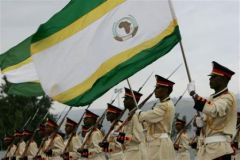Sudan set for UN showdown as African summit opens
Jan 28, 2007 (ADDIS ABABA) — The war in Darfur looked set to overshadow the opening of the African Union summit, with UN chief Ban Ki-Moon braced for showdown talks with Sudan.
 The government in Khartoum’s determination to assume the presidency of the organisation dominated the build-up to the two-day meeting which is also meant to cover issues ranging from the deployment of peackeepers to Somalia, global warming and the first World Cup in Africa.
The government in Khartoum’s determination to assume the presidency of the organisation dominated the build-up to the two-day meeting which is also meant to cover issues ranging from the deployment of peackeepers to Somalia, global warming and the first World Cup in Africa.
Chad has already threatened to storm out of the summit in Addis Ababa if other heads of state allow Sudan to take up the presidency as part of an agreement at their previous summit, when Khartoum reluctantly agreed to a deferment.
Extensive talks are understood to have taken place behind closed doors in recent days, with countries such as Ghana, Rwanda and Tanzania touted as possible alternatives.
UN and diplomatic sources have also suggested that the current chair of the 53-member organisation, Congo, extends its tenure.
But one of Sudanese President Omar al-Beshir’s top advisors insisted Sunday that Khartoum fully expected to take up the chairmanship.
“I do not think there’s another scenario because this is the decision of the AU last time in Khartoum,” Magzoub Khalifa told reporters in the Ethiopian capital.
Human rights groups have expressed outrage at the idea of Khartoum assuming the presidency given its record in Darfur.
The conflict has resulted in the deaths of an estimated 200,000 people and displaced nearly 2.5 million people since 2003, according to UN figures disputed by Khartoum.
Ban’s meeting with Beshir is expected to be particularly tense after the former South Korean foreign minister held Beshir personally responsible for recent violence.
“We are going to appeal that he should think of the millions of people who are suffering from this humanitarian (tragedy),” the UN chief said on his way to Ethiopia.
“I would urge him to cease all his bombings and attacks on civilians (in Darfur).”
Ban in particular wants to prod Beshir to follow through on his acceptance of a robust UN-AU force to replace a poorly-equipped 7,000-strong AU mission which has struggled to make any impact.
However Khartoum’s vision of what should constitute the so-called “hybrid force” is markedly different from that of Ban.
Khalifa said it should be a “hybrid operation” rather than hybrid force and warned Ban “not to come with new ideas on that”.
Another proposed AU force, this time for Somalia, is also expected to feature heavily in bilateral and closed-door meetings.
Key regional players, including interim Somali President Abdullahi Yusuf Ahmed and Ethiopia’s Prime Minister Meles Zenawi were among those attending closed-door talks on Sunday night.
Ethiopian intervention last month led to the toppling of a coalition of hardline Islamists in Mogadishu, to be replaced by Yusuf’s still weak government.
The AU is meant to send a 7,600-strong force to Somalia at the end of the month but with only Malawi, Uganda and Nigeria pledging troops, that deadline is bound to be missed.
Ban is likely to come under pressure to help fund the stabilisation force in a country which has been a byword for anarchy for the 16 years.
A statement issued after Sunday’s talks “called up the international community to disburse the funds without delay and without political preconditions”.
Once the issue of the chairman is resolved, heads of state are due to hold a range of debates on issues from regional security to climate change, with an address from Sir Nicholas Stern, author of a new report by the British government which warned of the catastrophic consequences for Africa of global warming.
(AFP)
